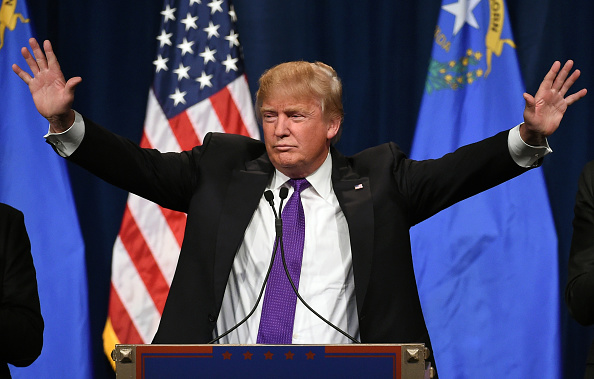
Donald Trump is very close to taking over the broken Republican Party, and the Grand Old Party will never be the same.
Ever the opportunistic deal-maker, Trump capitalized on the Republican elite fear of his candidacy and has almost locked down the nomination on the cheap. Every other candidate still in the race (except Ohio Governor John Kasich) has spent more than $50 million in combined soft and hard campaign funds to lose to Trump. Trump has spent around half of that for his back-to-back wins in three states that are historically decisive, with money that’s mostly his own.
Trump has been clear about his strategy from the start—he’s the man who buys politicians, not the reverse like everyone else. That’s why it’s galling that elites in both parties claim to be baffled by the anger propelling Trump and Bernie Sanders. Is that really possible? Can’t they see Americans are fed up with the pay-to-play corruption that turns campaign promises into dust the moment a candidate from either party is elected? Many Americans on the right and the left know that the game is rigged. They see politicians getting rich as soon as they leave office, if not before. They see failed bankers getting rich off taxpayer bailouts. These voters sure aren’t getting rich themselves.
On the left, Hillary Clinton’s superior campaign will likely ultimately counter Sanders. The Republicans can’t claim similar competency. The party, and the transactional big money and big government it stands for, is completely out of touch with its electorate. While party and media elites were reassuring themselves that Trump was a passing fad, he set about stomping the field. Trump used the grassroots outrage at who the party had come to stand for to bring it down.
Perhaps there was little that the Republican National Committee could do to stop Trump—but the debates certainly helped Trump’s ascent. Trump’s early poll numbers gave him center stage and more speaking time, and other candidates never overcame his initial advantage. Trump even used his power to dictate the terms of his participation, saying he wouldn’t participate unless the debates were shortened to two hours from three. It hurt Trump in Iowa when he finally did sit out a debate, so what if his hand had been forced earlier in the process?
Trump entered the race in June, so this was all many months in the making—which is why I’m fed up with Republicans saying they didn’t see Trump coming. Everyone saw it, but an unprincipled, opportunistic GOP political class squandered time and money destroying one another instead of the bully in their midst.
His opponents put short-term electoral strategy ahead of actual principles. In the early stages of the rise of Trump this summer, candidates quickly realized that anyone who took him on—such as Sen. Rand Paul and former Florida Governor Jeb Bush—immediately suffered. That justified the cowardice: Everyone else opted to play nice, stay on the debate stage, and maintain donor interest rather than risk their poll numbers. Only 4% of the $215 million in Super PAC funds went to attacking Trump.
Sen. Ted Cruz made a major miscalculation. Cruz cavorted with his “friend” Donald in the fall at a rally attacking the Iran deal, gushing over his respect and how “proud” he was to stand with Trump. Cruz criticized his competitors who had the courage to stand up to the bully. When the love affair went sour, Cruz viciously turned on his soulmate—and his camp wonders why people think their candidate is a craven opportunist.
Sen. Marco Rubio seems afraid to really take on Trump. He trains his fire on Cruz in a desperate battle for second place. Cruz returns fire, helping Trump rise even faster. Rubio claims victory despite losing one primary after another. I’ve had that job: promoting good-news stories for the State Department in Baghdad in August 2006. You can always find glimmers of sunshine in a war zone, but there’s never a good way to spin a car bomb.
It’s Trump who has blown up the race. Will he blow up the Republican Party? Trump is winning, not Rubio—no matter how much the establishment might wish otherwise. Trump voters are not stupid. The joke with Republican Beltway operatives has always been that the base is ideologically at odds with the party. Well, the base gets the joke and wants revenge. They see a transactional political class and have responded to Trump accordingly.
When Trump eventually prevails, we will have witnessed the collapse of the modern Republican Party. I’m conflicted as I witness the carnage. Taking our party back—the concept invigorates me. But the bully we’re handing it to petrifies me. I fear Donald Trump less for his policies than his tactics; he incites violence at his own political rallies.
I fear Donald Trump lording over the entirety of the power of the federal government, and how he would crush dissent. I fear Donald Trump because it seems that there is no low too low for him to stoop, whether it’s bashing all Mexican immigrants and Muslim refugees or harassing female journalists and making fun of the disabled. I fear Donald Trump because of his flagrant disrespect for the truth. But most of all, I fear Donald Trump because he brings out the worst in Americans, not the good that I believe is still there.
More Must-Reads from TIME
- Cybersecurity Experts Are Sounding the Alarm on DOGE
- Meet the 2025 Women of the Year
- The Harsh Truth About Disability Inclusion
- Why Do More Young Adults Have Cancer?
- Colman Domingo Leads With Radical Love
- How to Get Better at Doing Things Alone
- Michelle Zauner Stares Down the Darkness
Contact us at letters@time.com